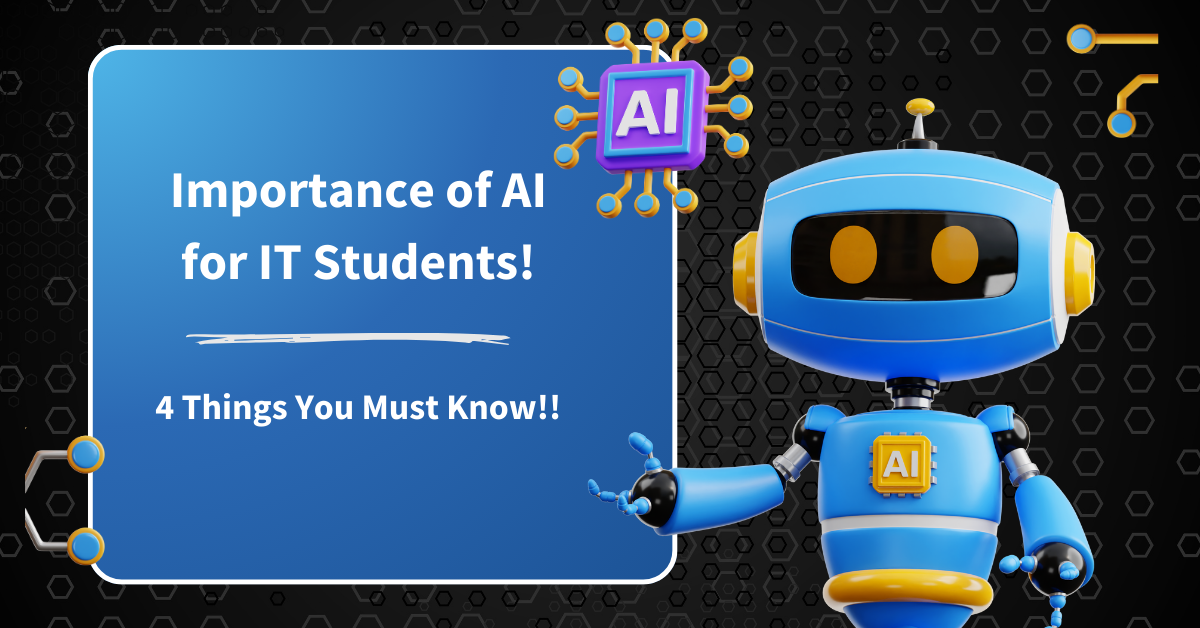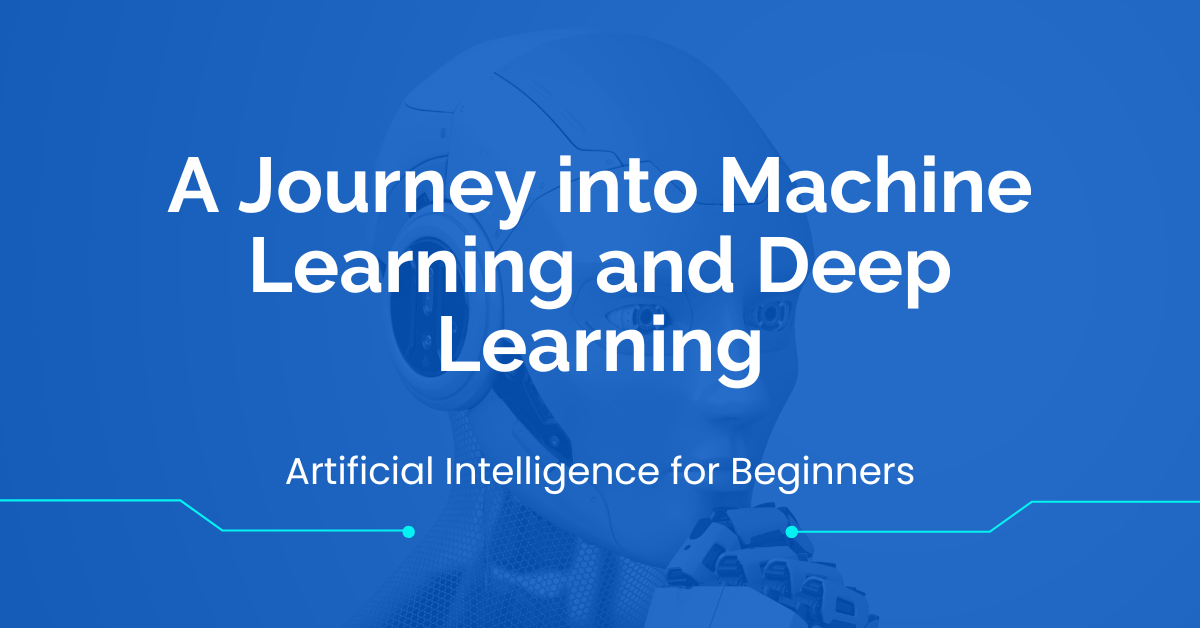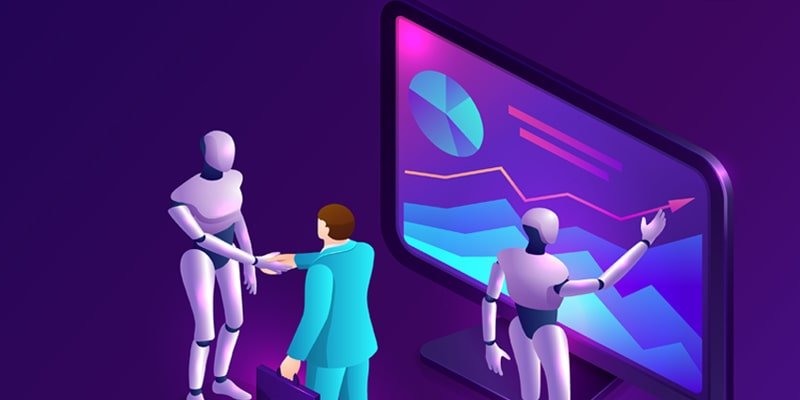Are you fascinated by the endless possibilities of technology? You definitely must’ve seen self-driving cars navigate complex city streets, virtual assistants respond to your voice commands, and recommendation systems tailor your favorite music playlist like living in a sci-fi movie. But it’s not sci-fi, it’s AI.
Artificial Intelligence (AI) is the magic behind these modern wonders, and it’s your pathway to a dynamic and promising future in IT. In this blog, we’ll embark on a journey through the captivating world of AI and its significance for Information Technology students.
AI vs. IT: Different Goals, Shared Path
AI and IT may appear similar at first glance, but they are distinct in their objectives. IT primarily deals with capturing, storing, analyzing, and transmitting data to provide valuable information. In contrast, AI is on a mission to create intelligent systems capable of learning, reasoning, adapting, and executing tasks like humans, making them inherently smarter.
How AI is Revolutionizing the IT Industry
AI and IT are progressing hand in hand, rejuvenating traditional IT systems into intelligent ones that can optimize operations and save time and costs. Automation and optimization are at the heart of AI’s role in Information Technology. Here are a few key applications of AI in IT:
- Data Security: In the digital age, safeguarding confidential data is paramount. AI fortifies IT systems by detecting threats, identifying data breaches, and offering swift solutions to security challenges, ensuring that sensitive information remains protected.
- Enhancing Information Systems: The foundation of any system lies in efficient and error-free coding. AI systems suggest algorithms and identify software bugs, streamlining the development process by offering recommendations based on performance data, thus saving time and resources.
- Process Automation: AI, integrated with deep learning networks, automates backend processes, reducing manual labor and enhancing system efficiency. AI algorithms continuously improve as they learn from their own mistakes, ensuring optimized code execution.
- Quality Assurance: AI anticipates potential issues during the software development cycle, significantly reducing deployment time by detecting and rectifying errors early in the process, ultimately ensuring the quality of the final product.
- Server Optimization: Servers often face a deluge of requests, and AI can optimize the hosting service, ensuring prompt responses and seamless operations. AI-driven IT staffing demands facilitate smoother integration of business and technology functions.
The IT sector’s rapid digital transformation has been powered by AI, enhancing efficiency, boosting productivity, and assuring quality. This technology enables IT professionals to focus on strategic, creative tasks, unleashing the potential for innovation and expansion. AI’s advanced algorithmic functions make the development and deployment of large-scale IT systems, once considered insurmountable, possible.
AI and IT: A Powerful Partnership
AI and IT work in synergy, with AI serving as a valuable complement rather than a replacement. The concerns of AI rendering jobs obsolete are valid to some extent. While AI can handle specific tasks and processes with unmatched efficiency, many aspects of IT still require human insight and creativity.
AI, when paired with IT, offers several key benefits, including:
- AI in Service Management: AI streamlines service management, analyzing data and providing users with suggestions and solutions, creating a more effective and efficient service experience.
- AI for IT Operations (AIOps): AIOps, driven by AI and machine learning, improves IT infrastructure by continually analyzing and implementing necessary changes, ensuring smooth operations.
- AI in Business Process Automation: Automation is a primary benefit of AI, helping IT companies reduce costs and minimize manual work while AI algorithms continuously learn and enhance their capabilities.
- AI in Fraud Detection: AI’s machine learning can efficiently process large datasets to identify patterns of fraudulent behavior and strengthen preventive measures.
The Future of AI and IT
The amalgamation of AI into the realm of Information Technology promises a journey marked by unparalleled efficiency, heightened productivity, and continuous innovation. With the ever-evolving landscape of AI, it acts as a vital complement to IT professionals, automating mundane tasks, streamlining processes, and elevating the industry’s overall efficacy.
The exponential growth of AI in the IT sector is a testament to its transformative potential. AI is not a threat to IT but a powerful ally, propelling Information Technology into a future where the possibilities are boundless. It’s a partnership that promises to redefine how we work, innovate, and secure the digital world. The future of IT is intelligent, thanks to the evolution of AI.
In conclusion, the importance of AI for Information Technology students cannot be overstated. The ever-growing partnership between AI and IT not only enhances efficiency and productivity but also opens up a world of innovation and boundless possibilities.
As Artificial Intelligence (AI) continues to evolve and integrate into the IT sector, it becomes an indispensable tool that empowers students and professionals alike to navigate the dynamic landscape of technology. Embracing AI in the world of Information Technology is not just a choice; it’s a vital step toward a brighter, more intelligent future in IT.
You can start your AI Learning with our intensive Python with AI Training Program.







